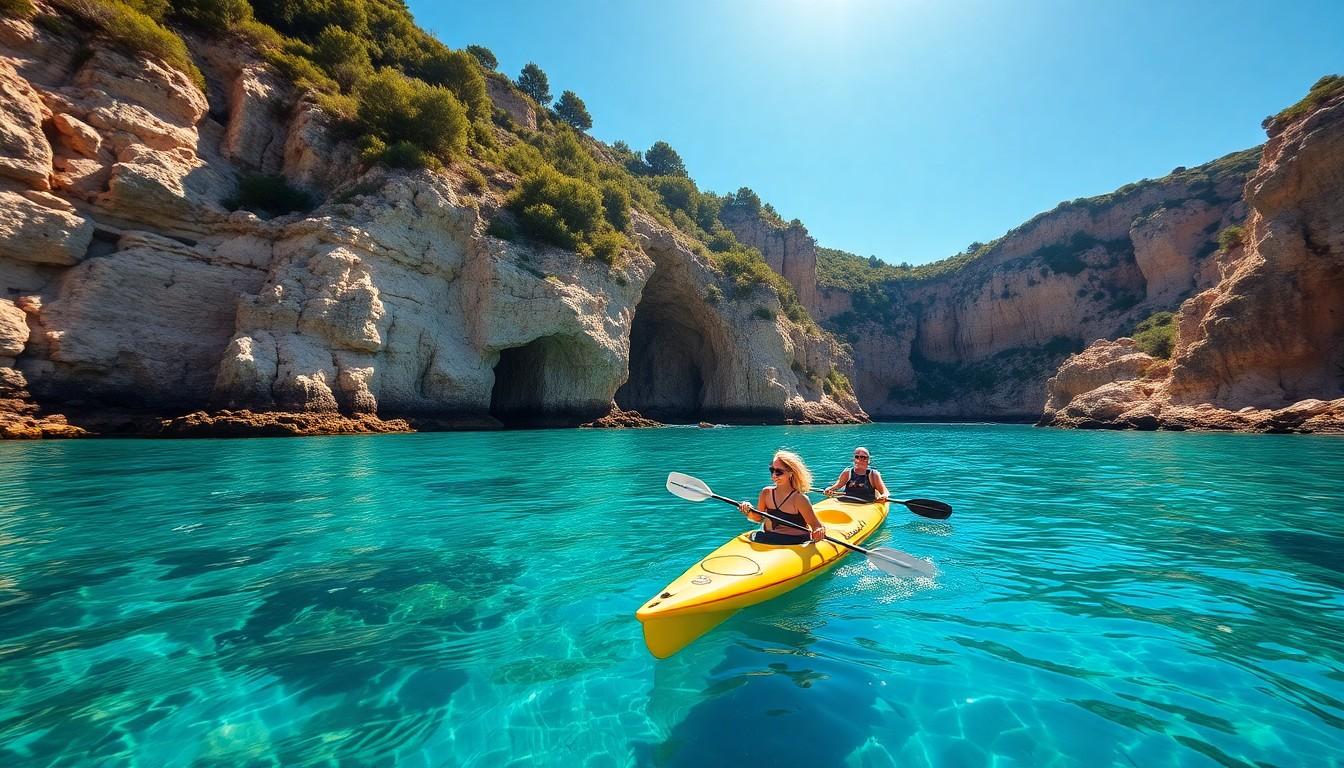Spain isn’t just about flamenco, paella, and sun-soaked beaches. It’s also a paradise for eco-tourists looking to explore nature while treading lightly on the planet. Imagine hiking through lush forests, sipping organic wine in sunlit vineyards, or spotting rare wildlife in breathtaking national parks. Now that’s a vacation that even Mother Nature would approve of!
Eco Tourism In Spain
Eco-tourism in Spain encompasses diverse experiences that prioritize environmental sustainability and cultural respect. Opportunities abound for travelers interested in exploring natural landscapes while minimizing their ecological footprint. Spain’s unique geography fosters rich biodiversity, making it an ideal location for eco-friendly visits.
Various regions, such as Galicia and Andalusia, offer stunning hiking trails that navigate pristine forests and breathtaking coastal areas. Nature enthusiasts can enjoy birdwatching in Doñana National Park, home to numerous rare bird species. Exploring Montserrat’s mountain range showcases Spain’s geological diversity and cultural heritage.
Organic vineyards thrive in areas like La Rioja, allowing visitors to taste locally produced wines that reflect sustainable farming practices. Many wineries welcome guests for tours that highlight eco-friendly viticulture. This focus on organic agriculture enhances the connection between tourism and conservation.
Experiencing traditional festivals provides insight into Spain’s culture while promoting eco-conscious practices. Events often emphasize local crafts and foods, supporting regional economies. Engaging with local communities enhances visitors’ understanding of sustainable tourism’s role in preserving cultural identities.
The rise of eco-lodges throughout Spain also highlights a commitment to eco-friendly accommodations. These lodgings often utilize renewable energy sources and promote environmentally conscious activities. Supporting these establishments fosters responsible tourism that respects both the environment and local communities.
Prominent organizations encourage eco-tourism initiatives, ensuring that travelers contribute positively while enjoying Spain’s natural beauty. With an increasing number of options, eco-tourism in Spain represents a growing movement that marries leisure with environmental stewardship.
Popular Eco Tourism Destinations

Spain offers numerous eco-tourism destinations, blending natural beauty with sustainable practices.
Coastal Areas
Costa Brava stands out for its stunning coastlines and ecological significance. Visitors often explore the rich marine biodiversity in its protected waters. The Mediterranean climate encourages various outdoor activities. Kayaking and snorkeling provide insights into vibrant underwater ecosystems. Sustainable accommodations and local seafood restaurants promote responsible tourism. Eco-friendly initiatives often focus on preserving the region’s natural habitats.
Protected areas, including Cap de Creus Natural Park, showcase unique landscapes and hiking trails. Local guides share knowledge about flora, fauna, and conservation efforts. Travelers frequently engage in birdwatching, a popular activity along the coast.
Mountain Regions
Picos de Europa National Park captivates travelers with its majestic peaks and diverse wildlife. Hiking trails wind through serene landscapes, attracting nature enthusiasts year-round. Visitors often encounter endemic species, such as the Cantabrian brown bear and the Iberian wolf.
Sierra Nevada offers eco-tourism activities year-round, including hiking in summer and skiing in winter. Nearby traditional villages provide insight into local culture and gastronomy. Eco-lodges in these mountainous regions utilize renewable energy and promote local craft consumption. Adventure tourism, such as climbing and canyoning, takes advantage of breathtaking scenery, enhancing the eco-friendly experience.
Both areas emphasize sustainability, supporting local economies while preserving natural beauty.
Activities Promoting Eco Tourism
Eco-tourism in Spain includes various activities that connect travelers to nature while promoting sustainable practices. Engaging in these activities boosts environmental awareness and supports local communities.
Wildlife Observation
Witnessing Spain’s diverse wildlife offers a thrilling experience. Visitors can explore habitats in national parks such as Doñana and Picos de Europa, where guided tours enhance the exploration. Birdwatching in Doñana National Park attracts bird enthusiasts, featuring species unique to the region. Rescued wildlife programs often involve volunteers, providing community engagement and education. Responsible observation techniques help minimize disturbance, ensuring that wildlife remains undisturbed. Tour operators emphasize adherence to best practices, promoting environmental conservation while supporting local economies.
Sustainable Hiking
Sustainable hiking invites travelers to discover Spain’s stunning landscapes while prioritizing eco-friendly practices. Trails throughout regions like Galicia and Andalusia offer breathtaking views and a chance to connect with nature. Local guides frequently educate hikers about plant species, geological formations, and conservation efforts. Utilizing well-marked paths protects ecosystems, helping maintain the area’s natural integrity. Community-based hikes foster cultural connections, showcasing traditional crafts and local cuisine. Eco-friendly accommodations often support hiking initiatives, ensuring a holistic travel experience that respects the environment.
Benefits Of Eco Tourism In Spain
Eco-tourism in Spain promotes environmental sustainability while offering enriching travel experiences. It supports the country’s efforts to preserve its unique ecosystems and cultural heritage.
Environmental Conservation
Promoting eco-tourism enhances environmental conservation efforts across Spain. Protected areas like national parks provide habitats for diverse wildlife, allowing visitors to appreciate nature’s beauty. Responsible tourism practices contribute to the preservation of pristine landscapes such as the rugged mountains of Picos de Europa and the serene coastlines of Costa Brava. Conservation initiatives often receive funding from eco-tourism revenues, creating a positive feedback loop. Travelers who engage in activities like guided wildlife observation contribute to scientific research and monitoring. Favoring eco-friendly accommodations ensures that local ecosystems remain intact. Many eco-lodges utilize renewable energy sources and implement water conservation techniques, minimizing their ecological footprint.
Economic Growth
Eco-tourism stimulates economic growth in local communities throughout Spain. By supporting sustainable businesses, travelers directly contribute to job creation in rural areas. Regions such as La Rioja thrive as visitors flock to experience organic vineyards and tastings. Growth in eco-lodging and sustainable dining options increases revenue for local farmers and artisans. Increased attention to responsible practices attracts more tourists who prioritize eco-friendly experiences. As awareness of Spain’s ecological offerings grows, communities adapt by developing eco-tourism infrastructure, enhancing economic stability. Sustainable tourism fosters entrepreneurial opportunities, enabling residents to offer guided tours, workshops, and cultural experiences. Overall, eco-tourism promotes economic resilience while ensuring the preservation of Spain’s cultural and natural heritage.
Challenges Facing Eco Tourism
Eco-tourism in Spain faces challenges that threaten its growth and sustainability. Addressing these issues is crucial to maintaining the integrity of eco-friendly travel.
Over-Tourism
Over-tourism significantly impacts natural habitats and local communities. Increased visitor numbers in popular destinations, like Costa Brava, lead to congestion and resource strain. Local wildlife experiences stress due to habitat disruption caused by large crowds. Tourists often overlook sustainable practices, resulting in litter and damage to the environment. While eco-tourism promotes responsible travel, the rising popularity sometimes conflicts with its principles. Communities may struggle to balance visitor enjoyment with the preservation of cultural and natural heritage. Local governments and organizations are exploring strategies to manage tourism flow, ensuring that eco-tourism remains sustainable while benefiting areas like Galicia and Andalusia.
Environmental Impact
Environmental impact concerns arise as eco-tourism expands. Visiting pristine areas, such as Picos de Europa National Park, can disturb ecosystems if not managed properly. Wildlife habitats may suffer from increased human presence, affecting biodiversity. Additionally, the use of resources in constructing eco-lodges and facilities raises questions about sustainability. Some projects prioritize environmental sustainability, yet others may fall short, causing unintended consequences. Maintaining a focus on renewable energy sources and eco-friendly practices is essential for minimizing negative effects. Initiatives supporting conservation efforts can strengthen the link between eco-tourism and the environment, allowing travelers to enjoy Spain’s natural beauty with a clear conscience.
Vital for Tourists and Local Communities
Spain’s eco-tourism scene offers a unique blend of adventure and sustainability. With its breathtaking landscapes and rich cultural heritage travelers can immerse themselves in nature while supporting local economies. The commitment to responsible tourism practices ensures that visitors enjoy authentic experiences without compromising the environment.
As eco-tourism continues to grow in Spain it becomes vital for both tourists and local communities to prioritize sustainable practices. By choosing eco-friendly accommodations and engaging in conservation efforts travelers can help protect the stunning ecosystems that make Spain a remarkable destination. This harmonious relationship between tourism and nature fosters not only unforgettable memories but also a brighter future for Spain’s natural and cultural treasures.

